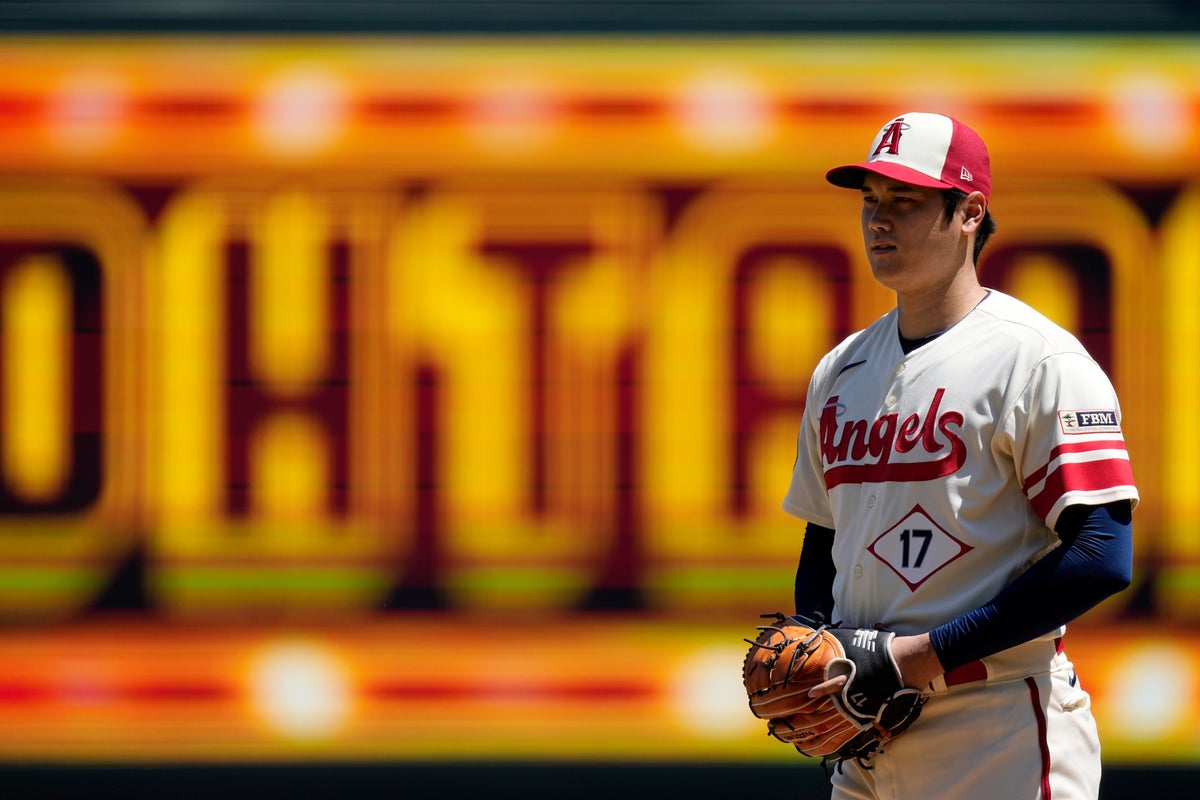
If Shohei Ohtani has a second Tommy John surgery, it’s possible his recovery might be more difficult than the first — but not a given.
“My first one, my rehab was pretty tough and I never felt 100%," Chicago Cubs pitcher Jameson Tallion said. "People would come up to me and ask me, ‘Hey, dude, what should I expect after getting Tommy John?’ I’d be like: to never feel good ever again.
"My second one was just like a new arm.”
Ohtani tore the ulnar collateral ligament in his right elbow while pitching against Cincinnati on Aug. 26. The unprecedented two-way star is continuing to bat as a designated hitter but won’t pitch again this year while considering his medical options.
Now 29, Ohtani had Tommy John surgery on Oct. 1, 2018, performed by Los Angeles Dodgers head team physician Dr. Neal ElAttrache. He returned to the Angels as a batter the following May 7 and to the mound on July 26, 2020, in a season delayed by the pandemic. He didn’t retire a batter in his return, got just five outs on Aug. 2 and left with a strained forearm that kept him from pitching until 2021.
Since then, he’s gone 34-16 with a 2.84 ERA in 74 starts.
Combine that with his offense the last three seasons — a .278 average, 124 homers, 290 RBIs and 56 stolen bases entering Friday mostly as a designated hitter — and expectations before the injury were that the 2021 AL MVP could command a record $500 million-plus contract as a free agent this offseason.
If Ohtani has the surgery, he wouldn’t pitch again until 2025 at the earliest. Recovery time for most pitchers ranges from 12 to 18 months, though positions players have returned quicker. Philadelphia’s Bryce Harper was back as a designated hitter in May, just 160 days after the operation.
The UCL connects the humerus bone to ulna bone at the elbow. Doctors prefer to replace the torn ligament with an almaris longus tendon from the forearm. If that isn’t available, a gracilus tendon removed from the knee is the No. 2 choice.
A second surgery often is more complicated than a first, with recovery time impacted by scar tissues and bone spurs. Pitchers often can resume throwing in week 17 following their first Tommy John. New York Mets medical director Dr. David Altchek said after a second TJ surgery, throwing might be delayed until week 21 or even 41.
“What I’ve seen is a big retear rate,” said Altchek, who twice operated on Taillon and estimates he has performed 1,800 Tommy John surgeries since 1993.
“We think that some of the training methods may have something to do with it: the weighted balls. I’m not against weighted balls. Weighted balls do definitely increase velocity, but they put a lot more pressure on the ligament. If I get to decide what my patients do, I don’t want them to even go near throwing a weighted ball with any velocity for like a year and a half to two years after the surgery.”
Minasian has not detailed the extent of the tear and said Ohtani and his agents were consulting medical experts.
“There’s a lot of information that we don’t know yet that we will need to know before determining what kind of recovery process he’s going to have to go through or whether or not a surgery will be needed,” said Dr. Matthew Best, an orthopedic surgeon who is director of research at Johns Hopkins’ sports Medicine Division.
A spreadsheet of Tommy John surgery patients compiled by baseball analyst Jon Roegele lists 2,345 procedures, starting with Tommy John himself on Sept. 25, 1974, through Dodgers pitcher Tony Gonsolin on Friday. Roegele records 148 players who have had the procedure twice, including three times each for Jason Isringhausen, Jonny Venters, Ben Leeper and Corey Black.
“It’s more complicated,” said Yankees head team physician Dr. Christopher S. Ahmad of Columbia University. “There’s issues with scar tissue. If there has been prior surgery to the ulnar nerve, that makes it more technically demanding on the surgeon because the nerve has to be dissected free again of scar tissue, moved out of the way, and then the reconstruction performed.
"The exact placement of doing the surgery with tunnel creation, passing the graft becomes more challenging because the anatomy may be altered based on the prior surgery and the way that the healing has taken place.”
“Having said all that,” he added, "revision Tommy John surgery is having more success than has been reported historically in the past. We used to say that Tommy John surgery done a second time may have a 50% success rate. Now the success rate is improving, 60, 70.”
Most prominent among those who have come back from a second TJ are Nathan Eovaldi and Taillon. Hyun Jin Ryu returned last month, Walker Buehler is nearing a comeback with the Dodgers, and Jacob deGrom had his second TJ operation in June.
“The assumption is that the new tissue, whatever you put in there, is going to heal slower because the environment has already been kind of mucked around with,” Altchek said.
___
Freelance writer John Perrotto contributed to this report.







